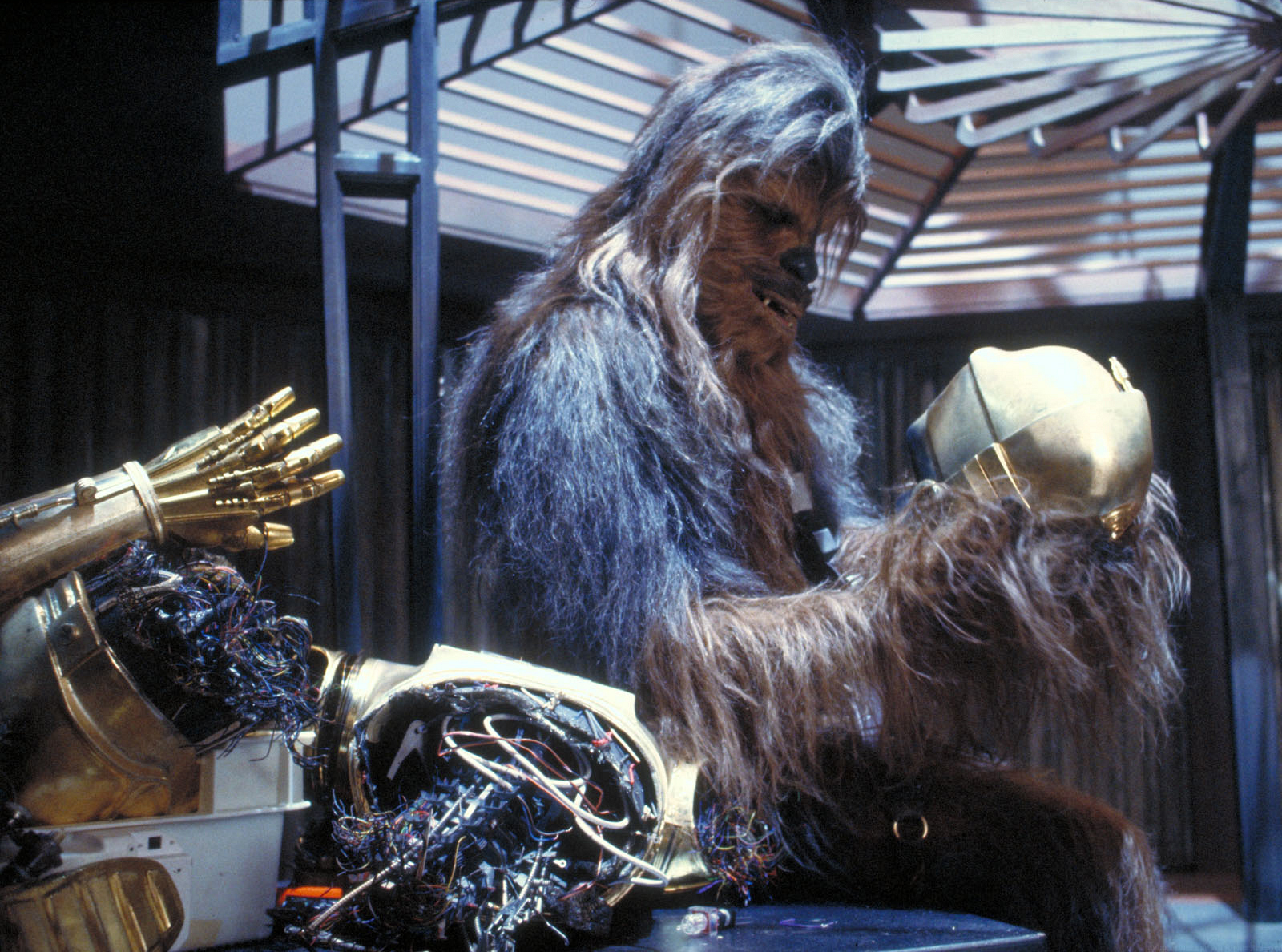It’s been over 400 years since the last new Shakespeare play was
released, so it’s probably safe to say that his stuff holds up over time.
Countless productions of his plays have been put on during and after
William Shakespeare’s lifetime, as well as many different adaptations.
His works have been referenced in many subsequent works, and have become
part of the culture. If you haven’t seen The Taming of the Shrew,
you’ll still understand Kiss Me, Kate. If you haven’t seen Romeo
and Juliet, you’ll still understand West Side Story. And if
you haven’t seen Hamlet, you’ll still understand The Lion King
(and Strange Brew, for that matter). Shakespeare has permeated our
culture, and some critics have even gone so far as to state that Shakespeare is
beyond criticism.

 Peter Mayhew as Chewbacca in Star Wars, 1977; John Gielgud in the title role in Hamlet, circa 1960. No, this is not a coincidence.
Peter Mayhew as Chewbacca in Star Wars, 1977; John Gielgud in the title role in Hamlet, circa 1960. No, this is not a coincidence.
There was one man, however, who decided that Shakespeare was most
certainly not beyond criticism. This man was an English doctor named
Thomas Bowdler, and he felt that Shakespeare needed an update for the 19th
century. Dr. Bowdler began a promising career in medicine which was cut
short when he caught a terrible fever from one of his own patients. Upon
his recovery, he found himself disinclined to practice medicine anymore.
Bowdler turned his energies toward a cause he felt strongly about, prison
reform, and was also regarded as one of the best chess players of his time.
In 1788, he published a book about the patriotic uprising in Holland
titled Letters Written in Holland in the Months of September and October
1787, but this was not to be his best-known nor his most influential work.
What Bowdler would be remembered for was a four-volume set of books
called The Family Shakespeare.
The Family Shakespeare addressed what Bowdler saw as the problem of there being too many
bad words and blasphemies in Shakespeare’s plays. He recognized that
Shakespeare’s work was good—great, even—but think of the children! How
can you bring a poor, young innocent to a production of Macbeth and
expose them to Lady Macbeth crying, “Out, out, damned spot!” Think of the
questions they’ll have about this blasphemy! Bowdler reworked this famous
line into, “Out, out, crimson spot!” so kids could witness a wholesome stabbing
on the stage without the taint of blasphemy. In fact, the interjection
“God!” was reduced to the inoffensive “Heavens!” And that nasty business
of Hamlet’s sister Ophelia maybe committing suicide? In The Family
Shakespeare, the ambiguity is done away with, and it’s clear to the reader
that it was an accidental drowning. Also gone were any references to
prostitutes or sex, including all of Shakespeare’s famous bawdy innuendos.
The language was purified, minimizing any uncomfortable explanations that
an upstanding parent might have to explain to his or her children.
An 1819 advertisement for The
Family Shakspeare, second volume. Note the spelling of the
playwright’s name. This was not an uncommon spelling at the time, but by
1847, editions of Bowdler’s books were altered to reflect the now-standard
spelling Shakespeare.
|
The Family Shakespeare was a success. It sold well into the 19th century among
upright citizens everywhere. All four volumes were published under Thomas
Bowdler’s name, though his sister Harriet had considerable input in the
project. It’s likely that Harriet’s name was left off the book out of
fear that it wouldn’t look good if a woman were to understand all of
Shakespeare’s naughty innuendos. One contribution that Bowdler made
himself were the paragraphs introducing each reworked play, tabulating what was
changed and giving the reasons for his choices.
Bowdler went on to clean up another great work, Edward Gibbon’s History
of the Decline and Fall of the Roman Empire, from which he removed all the
racy bits, as well. (And in Rome’s decline, there were plenty of racy
bits.) He finished this project in 1825, the year he died.
You can’t call what Bowdler did censorship, since
censorship is something that governments do. Bowdler was acting as a
private citizen; no one was forced to buy his books. There’s no denying
that he was doing something to Shakespeare’s works, though. But what to
call it?
It wasn’t until 1836 that someone coined the word bowdlerize.
To bowdlerize something meant not to censor it, but to remove the
potentially offensive parts of a work. This new word has always carried
with it a suggestion that the very soul of the work was being watered down at
the expense of its very character. Bowdler’s editions had their defenders
for years after his death, but the word inspired by his efforts has never
really been used as a compliment. This practice has never gone away,
either. In 1993, conservative pundit William Bennett published “The Book
of Virtues,” a reworking of stories from literature throughout the history of
Western civilization. As popular as the book was, it received plenty of
criticism as a bowdlerization of these stories.


Comments